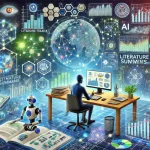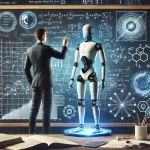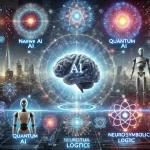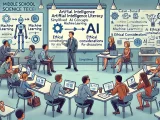
AI’s Impact on Society and Humanity
December 18, 2024Artificial intelligence (AI) has transitioned from the realm of speculative science fiction to a transformative force embedded in our everyday lives. From recommendation engines and language translators to facial recognition systems and autonomous vehicles, AI’s influence is expanding at a rapid pace. But with its rise comes an array of profound societal impacts, both promising and challenging. This post delves into AI’s evolution, its current state, and the steps necessary to navigate its societal implications responsibly.
Tracing the Evolution of AI
AI’s journey is as fascinating as its applications today. Its roots can be traced back to mid-20th century developments, although the concept of intelligent machines has been envisioned for centuries.
Early Visions
In the 1950s, two primary approaches emerged in the pursuit of machine intelligence:
- Symbolic AI: Focused on creating logic and symbolic representations of the world.
- Neural Networks: Inspired by the brain’s functioning, leveraging learning-based models.
The AI Winter
Despite initial enthusiasm, symbolic AI failed to deliver on lofty expectations, leading to the so-called “AI winter,” a period marked by reduced funding and interest.
The AI Spring and Current Boom
The 1990s ushered in a resurgence fueled by advancements in machine learning, deep learning, and neural networks. Recent decades have witnessed remarkable breakthroughs:
- Machine vision surpassing human object recognition capabilities.
- AI mastering complex strategy games like chess, Go, and StarCraft.
- The emergence of large language models capable of generating human-like text.
These developments highlight AI’s evolution into a powerful and versatile technology, yet its implications remain far-reaching and complex.
Understanding AI: A Multifaceted Definition
AI is often described as a “suitcase word,” carrying multiple meanings depending on the context. It can be defined in two key ways:
- Human-centric: AI performs tasks associated with human intelligence, such as reasoning, perception, and learning.
- Goal-oriented: AI acts to maximize goal achievement based on its understanding of the environment.
These diverse interpretations reflect the complexity of AI’s applications, ranging from neural networks to probabilistic methods, each catering to specific challenges.
The Societal Impact of AI
AI’s influence extends beyond technology, reshaping industries, economies, and ethical norms. While its potential benefits are significant, so are the challenges it presents.
1. The Future of Work
AI is expected to revolutionize the workforce, automating tasks and reshaping industries. While some fear widespread job displacement, others argue that AI will create new roles. However, the shift may require significant reskilling as cognitive tasks become increasingly automated.
2. Economic Implications
AI’s economic potential is vast, promising to boost global GDP. Yet, the benefits might not be distributed equally, intensifying income and wealth disparities. The race to develop AI is also driving international competition.
3. National Security Concerns
From cyber operations to autonomous weapons, AI is reshaping national security strategies. However, its use in surveillance and warfare raises profound ethical and security dilemmas.
4. Bias and Fairness
AI systems often mirror societal biases present in their training data, perpetuating issues of fairness, particularly in sensitive applications like hiring or facial recognition. Tackling bias requires conscientious data curation and algorithmic fairness.
5. Ethical and Public Trust Issues
AI systems can lack transparency and accountability, posing risks to public trust. This calls for greater emphasis on responsible AI development and governance.
Hard Problems and Limitations of AI
Despite its achievements, AI faces several challenges:
- Shortcomings: Current systems can produce biased, toxic, or inaccurate outputs. Privacy concerns and explainability gaps hinder trust.
- Conceptual Challenges: AI struggles with tasks like causal reasoning and generalizing beyond its training data.
- Artificial General Intelligence (AGI): While achieving human-level AI remains speculative, the debate over AGI’s feasibility and risks continues.
Reconsidering Humanity in the Age of AI
As AI becomes increasingly capable, it challenges long-held notions of intelligence, creativity, and humanity.
Rethinking Human Abilities
AI’s proficiency in areas once considered uniquely human—creativity, problem-solving, and language generation—forces us to redefine these attributes and their role in society.
Aligning AI with Human Values
Ensuring that AI aligns with human goals and ethical principles is a formidable task, complicated by the fluid and diverse nature of human values.
Building a Responsible AI Future
To harness AI’s benefits while addressing its challenges, we must adopt a forward-thinking approach:
- Safe and Powerful AI Development: Focus on creating systems that deliver societal benefits without causing harm.
- Promoting Societal Good: Deploy AI to address pressing global challenges, such as healthcare innovation and climate change mitigation.
- Governance and Responsibility: Establish frameworks to govern AI development, mitigate harmful uses, and manage competition.
- Adapting Societal Institutions: Redefine social and institutional structures to align with AI’s growing influence.
Conclusion: Shaping AI for Humanity’s Benefit
Artificial intelligence represents one of the most transformative technologies of our era, with the potential to drive profound progress across industries and societies. However, its development is not without risks. To ensure that AI becomes a net positive force, we must proactively address its ethical, societal, and technical challenges. The future of AI is not set in stone—it is a future we must consciously shape for the benefit of all humanity.
Reference
Manyika, J. (2022). Getting AI right: Introductory notes on AI & society. Daedalus, 151(2), 5-27.

















